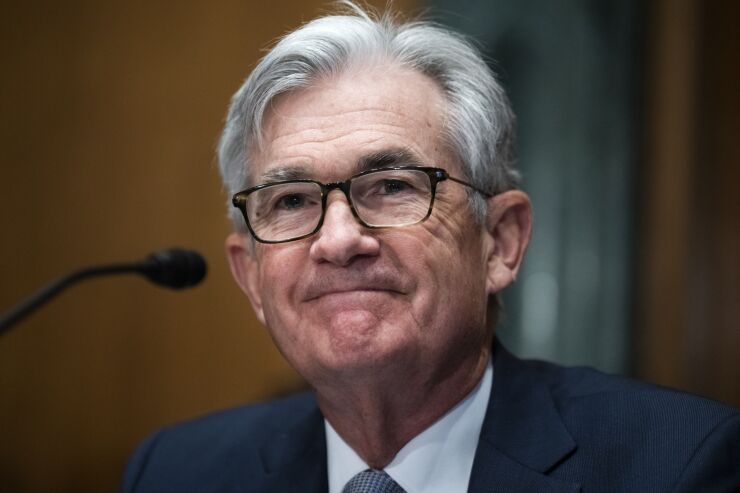Small-bank executives overwhelmingly think the U.S. economy will fall into a recession by 2023.
In an online survey conducted June 21-30, a whopping 96% of community bank leaders said they expect an economic decline to strike by the end of this year or sometime next year. Thoughts about the timing of when a recession will hit were split evenly among the group, with 48% of bankers saying they think it will happen this year and 48% predicting it will be a 2023 event.
Of the respondents who think a recession is approaching, 52% say the driving force will be an overcorrection by the Federal Reserve. The central bank is trying to tackle inflation, which rose by 8.6% in May, by raising borrowing rates, but some say the increases are too steep and coming too quickly.
The near-universal agreement that a recession is looming means “bankers think the economy is in real trouble,” said Paul Weinstein, a senior advisor at the deposit services provider IntraFi Network, which conducted the survey of community bank CEOs, presidents, chief financial officers and chief operating officers.
“There seems to be a lot of concern that the Fed is not handling this as best as it could, that it came in a little too late and might be moving a little too fast,” Weinstein said Tuesday.

Bankers in recent months have been growing increasingly pessimistic about the outlook for the economy, in part because they don’t think the Fed will be able to keep the economy out of a recession. In June, JPMorgan Chase CEO Jamie Dimon
“Right now it’s kind of sunny. Things are doing fine. Everyone thinks the Fed can handle this,” Dimon said at a conference. “[But] that hurricane is right out there down the road coming our way. We just don’t know if it’s a minor one or Superstorm Sandy or [Hurricane] Andrew.”
The central bank has raised interest rates by 1.5 percentage points since the beginning of the year, most recently in June when rates increased by 75 basis points, the
Fed Chairman Jerome Powell has said rates could rise another 50-75 basis points this month.
The fast-paced rise in rates should be good for banks — until it isn't. The higher interest earned on loan payments will at some point be offset by higher interest paid on deposits. The only questions are: When, and by how much?
More small-bank executives are worried about overcorrection than they were three months ago — 61% now compared with
“This was a huge swing … a 20-point jump,” Weinstein said. Previously, "a low majority of banks thought the economy was going into negative territory and now a very sizable majority think that.”
Discussions about the chances of a recession are likely to dominate
Weinstein said he wonders if so much talk about a downturn is turning into “a self-fulfilling prophecy where everyone is negative and concerned about the future. But what if we get some positive news from earnings statements or other pieces of the economy?”
“The question is, has the belief that we’re going into a recession taken such a strong hold that it won’t matter and won’t change the direction of where things are going?” he said.







